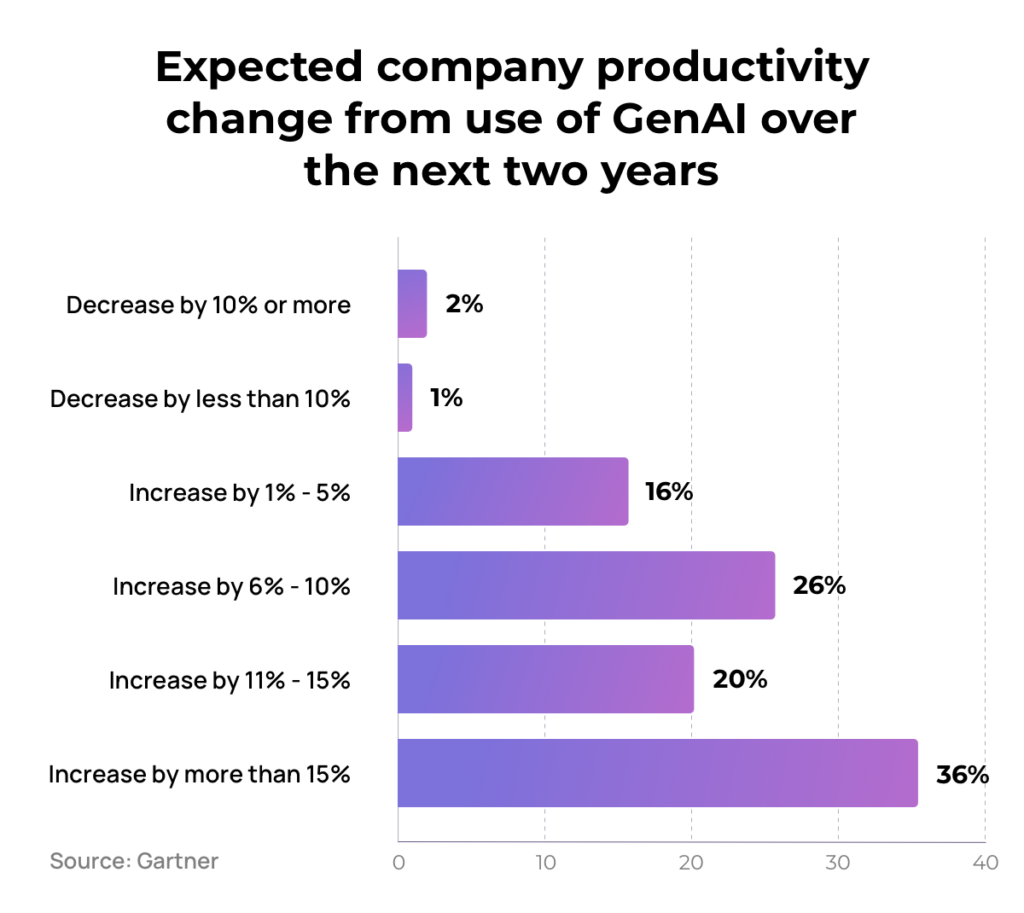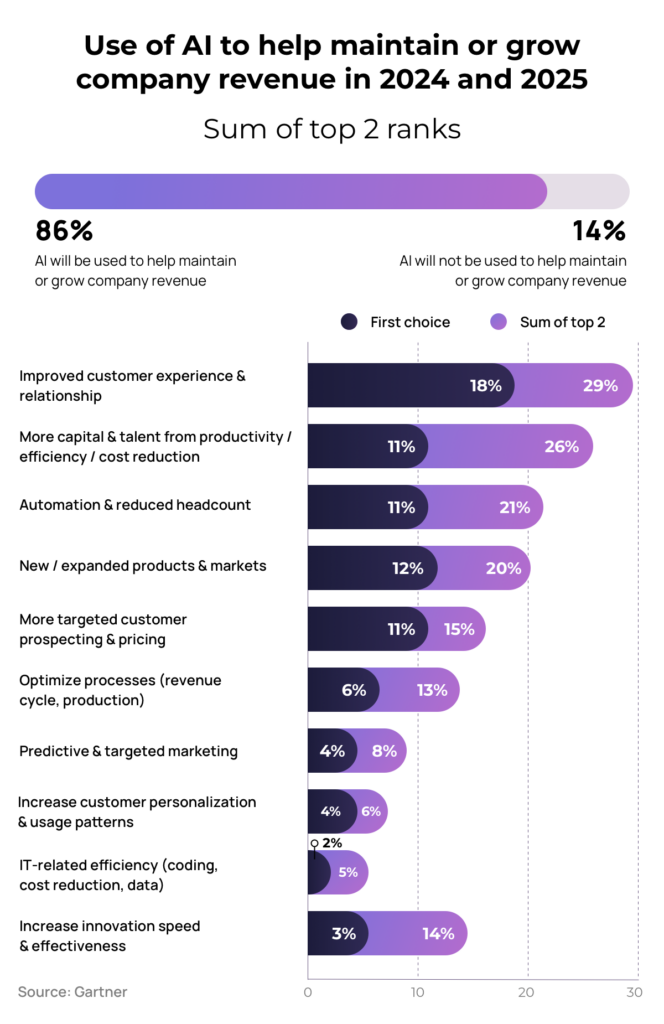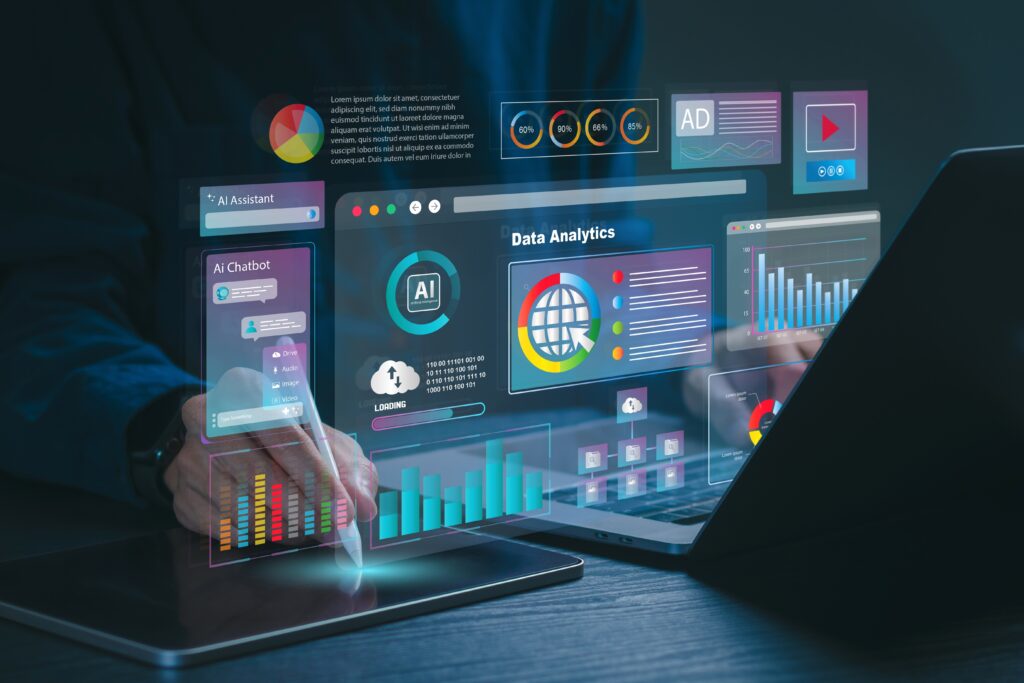-
Contents
- Introduction
- AI's Growing Influence in the C-Suite
- Practical Applications of Generative AI for Enterprises
- AI-Powered Transformation and Development
- Enterprise AI in Automation and Process Optimization
- AI in Data Management and Security
- Final Thoughts

Introduction
Artificial intelligence (AI) has rapidly emerged as a pivotal theme in enterprise AI transformation, surpassing other strategic priorities in the corporate landscape. The 2024 CEO and Senior Business Executive Survey reveals that a remarkable 34% of CEOs now see AI in the enterprise as the foremost force driving transformation, with operational efficiency and agility trailing significantly at just 9%. This surge in interest underscores the profound impact that AI, especially generative AI for enterprise, is expected to have, signaling a shift toward a more AI-centric business model.
As enterprise AI continues to gain momentum, businesses are actively exploring ways to integrate AI into their operations to secure a competitive advantage. This article explores the practical applications of AI in the enterprise, illustrating how companies can leverage AI for enterprise operations to enhance workforce planning, optimize stakeholder engagement, improve customer experiences, and more. By examining specific use cases and the tangible benefits AI offers, we aim to provide a comprehensive guide for businesses looking to capitalize on generative AI’s transformative potential.
AI's Growing Influence in the C-Suite
The rise of AI as the leading transformative technology reflects its growing importance in shaping business strategies. The survey by Gartner highlights that CEOs are not merely interested in AI—they are making it the cornerstone of their strategic focus, far outpacing other priorities. The significant gap between enterprise AI and other themes emphasizes the critical role AI in the enterprise is poised to play in the enterprise landscape, driving future growth and innovation.

The influence of AI on productivity is another area where enterprise leaders are placing substantial bets. Nearly half (49%) of the surveyed CEOs have already incorporated AI-powered productivity strategies. Of these, over one-third anticipate that enterprise AI will boost company productivity by more than 15% within the next two years. Interestingly, this optimism spans various industries, indicating a shared belief in the transformative power of Gen AI applications, despite some uncertainty about how these productivity gains will materialize.
Despite the uncertainties, the confidence in the benefits of generative AI for enterprise is overwhelming. A significant 87% of CEOs agree that the advantages AI brings to their organization outweigh the associated risks. This consensus reflects a growing belief in Gen AI capabilities to streamline operations, enhance overall productivity, and optimize operational efficiency, making its adoption a strategic necessity.

Practical Applications of Generative AI for Enterprises
AI-Backed Workforce and Organizational Analysis
Generative AI for enterprise is revolutionizing workforce and organizational analysis by providing deep insights into employee performance, engagement, and overall organizational health. Through advanced data analytics, AI-powered operations can process large volumes of employee data, uncovering patterns and trends that were previously undetectable. For example, enterprise AI tools can analyze performance metrics, employee feedback, and other relevant data to identify the underlying factors affecting employee productivity and satisfaction. Research indicates that enterprises using AI for workforce analytics can achieve up to a 30% improvement in employee performance and a 25% increase in engagement.
Agile Workforce Planning
Agile workforce planning is crucial for companies to adapt to changing conditions. Generative AI for enterprise supports this by offering predictive analytics and scenario modeling, enabling accurate forecasts of workforce needs based on trends and external factors. AI-driven workforce planning can enhance efficiency by 20-30% and reduce costs by 10-15%, allowing enterprises to develop flexible plans that quickly respond to changes and ensure they have the right talent at the right time. Additionally, AI in the enterprise helps identify skill gaps and recommends training to prepare the workforce for future demands.
Organizational Network Analysis
Organizational Network Analysis (ONA) is a valuable method for understanding informal relationships and communication patterns within an enterprise. Generative AI for enterprise enhances ONA by analyzing large volumes of communication data, such as emails and chat logs, to map social networks within the organization. This analysis reveals how information flows, identifies key influencers, and detects communication bottlenecks. Enterprises using AI for ONA see a 25% improvement in collaboration and innovation, highlighting the importance of optimizing internal networks for better performance.
Change Impact Assessments
Implementing organizational change is challenging, and understanding the potential impacts is critical for success. Enterprise AI aids in change impact assessments by simulating various change scenarios and predicting their effects on the organization. AI systems can analyze factors such as employee sentiment, workflow disruptions, and productivity shifts, providing a comprehensive view of how changes will impact different parts of the organization. Companies leveraging AI for change impact assessments experience a 20% increase in the success rate of change initiatives and a 15% reduction in transition costs, enabling leaders to develop effective change management strategies and ensure smooth transitions during periods of transformation.
Optimized Stakeholder Engagement
Effective stakeholder engagement is crucial for company success. Generative AI for enterprise enhances this by analyzing stakeholder data to predict interests, concerns, and reactions to decisions. AI tools segment stakeholders by influence and interest, allowing enterprises to tailor their communication and engagement strategies. Companies using AI for stakeholder engagement report a 20% increase in satisfaction and a 15% improvement in support for key initiatives. By facilitating personalized interactions, enterprise AI helps build stronger relationships, fostering trust and support for business goals.
Automated Service Desk and Support
The use of generative AI in service desk and support functions has significantly improved customer and employee experiences within enterprises. AI chatbots and virtual assistants handle routine inquiries, troubleshoot issues, and provide instant support, easing the burden on human agents. These systems learn and improve with each interaction, becoming more efficient over time. Organizations using AI for support systems reduce support costs by 25% and increase customer satisfaction by 30%. Additionally, enterprise AI can analyze support ticket data to identify recurring issues and suggest proactive measures, further enhancing service quality and customer satisfaction.
AI-Powered Transformation and Development
Transformation Roadmapping
Generative AI is essential in transformation road mapping, helping enterprises create detailed and actionable plans for digital transformation. AI tools analyze extensive data from various sources to identify opportunities, predict outcomes, and recommend strategic initiatives. A significant percentage of executives believe AI in the enterprise is key to achieving growth objectives and driving digital transformation. By leveraging enterprise AI, companies can develop comprehensive roadmaps that outline the necessary steps, resources, and timelines for successful transformation, ensuring they remain competitive in an ever-evolving market.
Continuous Learning & Development
Continuous learning and development are crucial for maintaining a skilled and adaptable workforce within the organization. Generative AI enhances this by offering personalized learning experiences tailored to individual employee needs. AI platforms analyze performance data, identify skill gaps, and recommend relevant training programs. Companies using enterprise AI for employee development see significant increases in retention and productivity, fostering a culture of continuous learning and driving organizational success.
Personalized Customer Experience
Personalizing customer experience is a critical differentiator in today’s competitive landscape. Generative AI for enterprise enables businesses to deliver highly tailored experiences by analyzing customer data and predicting preferences and behaviors. Enterprise AI-powered recommendation engines, chatbots, and personalized marketing campaigns can significantly enhance customer satisfaction and loyalty. Companies leveraging AI for personalization can increase their revenue and improve customer engagement, creating unique and engaging experiences that meet individual customer needs and preferences.
Risk Management and Mitigation
Effective risk management is crucial for protecting enterprises from threats and ensuring long-term stability. Generative AI enhances risk management by analyzing large datasets to identify patterns, predict risks, and recommend preventive measures. AI tools assess financial, operational, and market risks, enabling informed decision-making and impact mitigation. Organizations using AI in the enterprise for risk management see substantial reductions in risk-related losses and improvements in compliance, helping them navigate uncertainties and maintain resilience.
ROI Calculation & Optimization
Calculating and optimizing ROI is essential for enterprises to ensure their investments yield maximum returns. Generative AI for enterprise enhances ROI calculation by providing accurate and real-time insights into investment performance. AI algorithms can analyze financial data, market trends, and operational metrics to predict outcomes and recommend optimization strategies. Companies using enterprise AI for ROI optimization experience increased investment returns and reduced costs, enabling them to make data-driven investment decisions, allocate resources efficiently, and achieve optimal financial performance.

Enterprise AI in Automation and Process Optimization
Intelligent Process Automation
Intelligent Process Automation (IPA) is transforming business operations by automating routine tasks and optimizing complex workflows. Generative AI for enterprise enhances IPA by enabling systems to learn from data, adapt to changes, and continuously improve, leading to increased efficiency, reduced errors, and lower operational costs. Enterprises implementing AI for IPA achieve significant reductions in process cycle times and boost overall productivity. By automating tasks like data entry, invoicing, and customer service, enterprises can free up resources to focus on higher-value activities.
Automated Troubleshooting and Diagnostics
Generative AI is advancing automated troubleshooting and diagnostics, especially in IT and customer support within the enterprise. AI systems can analyze logs, detect anomalies, and diagnose issues in real time, often before they affect users. This proactive approach reduces downtime and enhances system reliability. Using AI for automated troubleshooting leads to significant reductions in downtime and lower maintenance costs, ensuring smooth operations and minimizing disruptions.
IT Infrastructure Optimization
Enterprise AI plays a crucial role in optimizing IT infrastructure by analyzing performance metrics, predicting resource needs, and automating resource allocation. AI tools can dynamically adjust computing resources based on demand, ensuring optimal performance and cost efficiency. Organizations using AI for IT infrastructure optimization reduce operational costs and improve system performance. By leveraging enterprise AI for infrastructure management, enterprises can achieve greater scalability, reliability, and cost savings.
Automated Configuration and Deployment
Generative AI is streamlining the configuration and deployment of IT systems by automating repetitive tasks and ensuring consistent, error-free setups. AI tools can automatically configure servers, deploy software, and manage updates, reducing manual intervention and associated risks. Companies using AI for automated configuration and deployment see significant reductions in setup times and deployment errors. By automating these critical tasks, enterprise AI enables faster, more reliable system deployments, leading to improved operational efficiency and reduced downtime.
AI in Data Management and Security
Data Analytics, Management & Governance
Enterprise AI is transforming data analytics, management, and governance by providing sophisticated tools for processing and analyzing large datasets. AI in the enterprise enables businesses to uncover previously hidden patterns and insights, driving more informed decisions. AI applications also automate data cleaning and preparation, ensuring higher accuracy and consistency. According to PwC, companies implementing generative AI for enterprise data management have seen a 40% improvement in data quality and a 30% reduction in management costs. Additionally, AI in the enterprise helps maintain compliance with data regulations by continuously monitoring and auditing data usage, reducing the risk of non-compliance and potential penalties.
Cyber Security & Threat Detection
As cybersecurity remains a top priority for businesses, AI significantly boosts threat detection and response capabilities. AI solutions can analyze vast amounts of data in real time to detect suspicious activities and potential threats, often preventing harm before it occurs. AI in the enterprise also learns from past incidents, adapting to new threats and providing a robust defense. IBM research shows that organizations using enterprise AI for cybersecurity have reduced the time to identify and contain breaches by 60% and decreased the cost of data breaches by 50%. These advancements help businesses safeguard their sensitive information and maintain customer trust.
Intelligent Document Processing
Generative AI for enterprise is leading the charge in Intelligent Document Processing (IDP), automating the extraction, processing, and analysis of information from various documents. AI efficiently handles unstructured data from invoices, contracts, and forms, converting it into structured, manageable data. This automation not only speeds up document processing but also minimizes errors and enhances data accuracy. Forrester reports that companies utilizing AI for enterprise document processing have achieved a 70% reduction in processing times and a 50% improvement in data accuracy. This streamlining of operations allows businesses to allocate resources more effectively.
Automated Security and Compliance Governance
Generative AI strengthens security analysis and compliance by automating vulnerability detection and monitoring regulatory adherence. AI in the enterprise continuously scans systems for weaknesses, providing real-time alerts and reducing the risk of cyber-attacks. Gartner reports a 30% reduction in security incidents and a 25% improvement in security posture for businesses leveraging enterprise AI.
Moreover, AI automates compliance processes by tracking regulatory changes and ensuring policies remain up-to-date, easing the burden on compliance teams. Deloitte found that generative AI for enterprise compliance initiatives led to a 40% reduction in compliance costs and a 30% improvement in adherence, ensuring systems stay secure and compliant while lowering operational overhead.
Final Thoughts
Enterprise AI is undeniably reshaping the business landscape, capturing the strategic focus of CEOs like never before. From my experience collaborating with business leaders, it’s evident that the commitment to AI in the enterprise goes beyond a trend—it’s an acknowledgment of the profound disruptive potential that AI offers across various industries. The 2024 CEO and Senior Business Executive Survey highlights this, with nearly half of CEOs already integrating generative AI into their productivity strategies. This widespread confidence in AI signals the dawn of significant advancements in business operations.
The practical applications of generative AI in enterprise that I’ve encountered are vast and highly impactful. From optimizing workforce planning to enhancing stakeholder engagement and improving customer experiences, the potential is limitless. As businesses I’ve worked with continue to explore and implement AI in enterprise solutions, the focus naturally shifts to delivering real, measurable benefits and maintaining a competitive edge.
In my experience, the key to success lies in deeply understanding and harnessing the power of generative AI for enterprise. It’s not just about adopting the latest technology but about confidently navigating the complexities of digital transformation, often in partnership with a reliable AI provider like Processica. By doing so, organizations can stay resilient and adaptable, thriving in an ever-evolving market.


